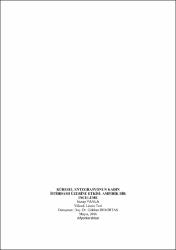| dc.contributor.advisor | Demirtaş Gökhan | |
| dc.contributor.author | Yayla Nuray | |
| dc.date.accessioned | 2019-11-29T07:43:47Z | |
| dc.date.available | 2019-11-29T07:43:47Z | |
| dc.date.issued | 2016 | en_US |
| dc.date.submitted | 2016 | |
| dc.identifier.uri | https://hdl.handle.net/11630/7345 | |
| dc.description.abstract | Bu tezin amacı, küresel entegrasyonun kadın istihdamı üzerine etkisini 113 ülke ve 1995-2012 yılları arasındaki dönem için incelemektir. Bu amaçla panel veri analizine dayalı sabit etkiler ve rassal etkiler modellerine göre tahmin yöntemleri kullanılmıştır. Analizde ülkeler OECD ülkeleri ve gelişmekte olan ülkeler olmak üzere iki farklı kategoriye ayrılmıştır. Kadın istihdamını belirleyen faktörler, doğurganlık, bağımlılık oranı, erkek işsizlik oranı, enflasyon, ekonomik büyüme olarak belirlenmiştir. Küreselleşme değişkeni olarak ise dış ticaret, doğrudan yabancı yatırımlar ve KOF endeksi kullanılmıştır. Çalışmanın dört temel sonucu bulunmaktadır. İlk olarak OECD ülkeleri için oluşturulan modelde küreselleşme değişkenlerinin tamamı kadın istihdamı üzerinde pozitif etkiye sahiptir. İkinci olarak doğrudan yabancı yatırımlar hem OECD ülkelerinde hem de gelişmekte olan ülkelerde kadın istihdamını pozitif yönde etkilemektedir. Üçüncü olarak gelişmekte olan ülkelerde dışa açıklık oranı ve ithalat kadın istihdamını negatif etkilerken ihracatın herhangi bir etkisi bulunmamaktadır. Son olarak gelişmekte olan ülkelerde ekonomik ve sosyal küreselleşme endeksleri kadın istihdamı üzerinde herhangi bir etkiye sahip değildir. | en_US |
| dc.description.abstract | The aim of this thesis is to examine impact the of global integration on women’s employment at 113 countries for the period between 1995 to 2012 years. For this purpose, based on the fixed effects panel data analysis and estimation methods are used according to the random effects model. The analysis is divided into two different categories of countries, including OECD countries and developing countries. The factors determining women’s employment are identified as fertility, dependency ratio, the male unemployment rate and inflation. Foreign trade, foreign direct investment and the KOF index are used as globalization variables. There are four main results of the study. First of all variables in the models of globalization for OECD countries has a positive effect on women's employment. Secondly, foreign direct investments affects women’s employment positively both in developing countries and OECD countries. Thirdly, the rate of openness in developing countries and import effect women’s employment negatively. On the other hand, export doesn’t have any effect on that. Finally, economic and social globalization indices in developing countries don’t have any effect on women’s employment. | en_US |
| dc.language.iso | tur | en_US |
| dc.publisher | Afyon Kocatepe Üniversitesi Sosyal Bilimler Enstitüsü | en_US |
| dc.rights | info:eu-repo/semantics/openAccess | en_US |
| dc.subject | Kadın İstihdamı, | en_US |
| dc.subject | Küreselleşme, | en_US |
| dc.subject | Panel Veri | en_US |
| dc.title | Küresel entegrasyonun kadın istihdamı üzerine etkisi: Ampirik bir inceleme | en_US |
| dc.title.alternative | The effect of globalızatıon on women’s employment: An empırıcal ınvestıgatıon | en_US |
| dc.type | masterThesis | en_US |
| dc.department | Sosyal Bilimler Enstitüsü | en_US |
| dc.relation.publicationcategory | Tez | en_US |
| dc.contributor.institutionauthor | Yayla, Nuray | |



















